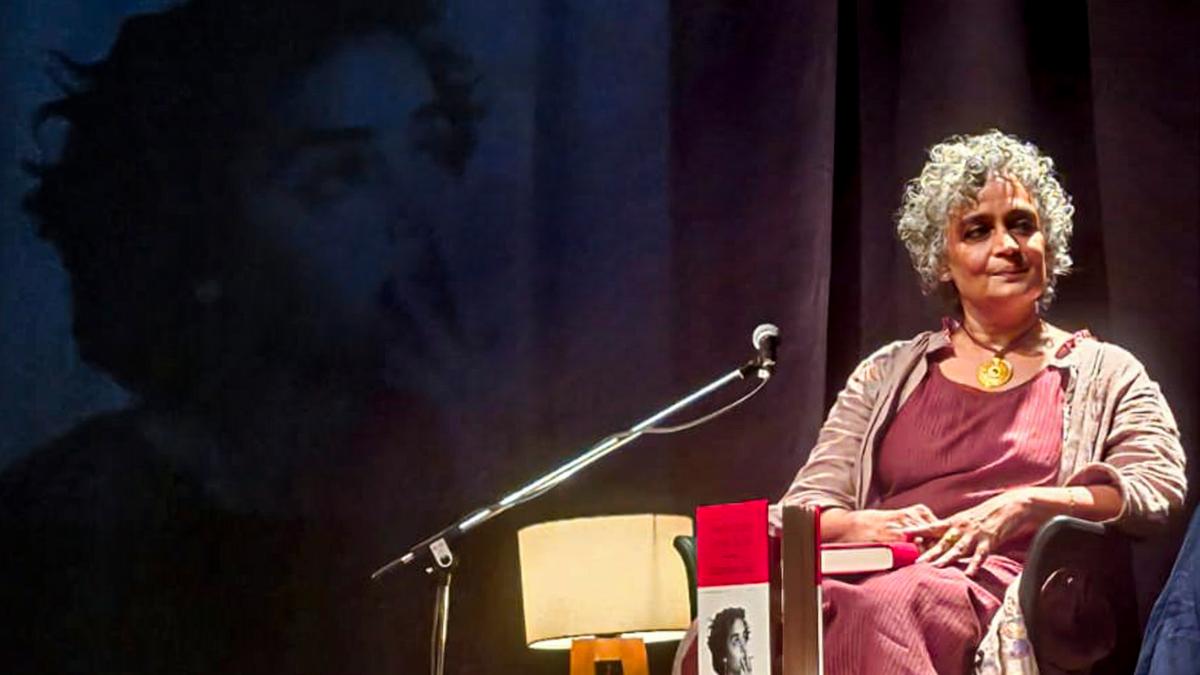New Delhi: During the launch of her candid memoir Mother Mary Comes to Me, Arundhati Roy made a striking statement: ‘Safety suffocates me.’
Speaking to the media after the event on Thursday, Roy’s words may seem unusual to some, but they are true to her character. Known for both her Booker Prize-winning novel The God of Small Things (1997) and her uncompromising political essays, Roy has long been unafraid to speak her mind, even in the face of controversy.
Her writing, she insists, stems from “a place of love and caring about something.” She told the media during an interview, “I write when it becomes harder to keep quiet than to write.”
This ethos has guided her since her first political essay, ‘The End of Imagination’, which tackled nuclear proliferation and its catastrophic consequences for humanity and the environment.
“People don’t understand why one gets so upset? Why do I write? Because it comes from a place of love. It comes from caring. Otherwise, why should I bother? Why shouldn’t I simply enjoy my Booker Prize or whatever it is,” she said, reflecting on her celebrated novel.
Roy doesn’t mince words. “Almost all the people we label ‘antinational’ are the ones who care. And those who call themselves great nationalists — I’d wager 99 per cent are dodging taxes, sending their children to America, doing everything possible to ensure that what happens in this country doesn’t touch their personal wealth or their… whatever bullshit,” she added with typical candour.
Though often described as both writer and activist, Roy finds the label reductive — likening it to the awkward term “sofa-bed”.
Her latest work charts the journey of a woman who finds comfort not in safety, but in danger. “The most dangerous place in the history of time has been writing. I’ve never been under any illusion that it was safe. So I’m fine here. It’s safety that suffocates me,” she declared.
Over the past two decades, Roy has authored both fiction and non-fiction — including The Ministry of Utmost Happiness — and penned essays on topics ranging from Kashmir, large dams, and globalisation to Dalit icon B. R. Ambedkar, Maoist rebels, and conversations with whistleblower Edward Snowden and actor John Cusack.
Her latest memoir delves into her complex relationship with her mother, Mary Roy — a pioneering educator and women’s rights activist who won a landmark case securing equal inheritance rights for Syrian Christian women in Kerala.
Roy said the book was born from “an onrush of memories and emotions” following Mary’s death in 2022 at the age of 89. “I wrote this book because I believe my mother is someone who deserves to be shared with the world.”
Mother Mary Comes to Me is an unflinching exploration of Roy’s turbulent life, offering raw reflections on her formidable mother. She describes the book as neither a judgement nor an accusation — and certainly not a hagiography. For Roy, the most compelling writing is that which “doesn’t resolve”.
“I never responded to her… I remained silent all these years, but here it is now. I tried not to judge her. I don’t know if that’s right or wrong, but I tried — and I think I succeeded,” she said.
“She’s an unusual character in her own right. It was difficult. But there’s no point in writing anything that isn’t difficult.”
Adored by her readers and vilified by her critics, Roy — recipient of the 2024 PEN Pinter Prize — has faced extreme reactions: effigies burned, events disrupted, accusations of sedition and contempt, and calls for her to leave the country.
Her rise to fame with The God of Small Things was not without controversy. She was charged with obscenity, the first of three criminal cases filed against her. One such case led to a day in jail for protesting against large dam projects during the Narmada Bachao Andolan.
In August, her book Azadi was among 25 titles banned in Jammu and Kashmir for allegedly promoting “false narratives and secessionism”.
Born in Meghalaya in 1961 and trained as an architect, Roy left Kerala at 18 and lived hand-to-mouth while trying her hand at various professions — including a stint at the National Institute of Urban Affairs, acting in Massey Sahib, and both acting and screenwriting in the National Award-winning In Which Annie Gives It Those Ones.
She credits her mother for instilling in her a “spine of steel” — the antithesis of a nurturing maternal figure. Roy recalls how Mary insisted that she and her brother, Lalith Kumar Christopher, address her as “Mrs Roy”, just like her students at Pallikoodam, the school she founded in Kottayam.
“It was as though, for her to shine her light on her students and give them everything, we — my brother and I — had to absorb the darkness,” Roy writes.
“She was tough, and that toughness put steel in my spine. So when people were protesting and calling me names, I’d just think, ‘Do you know whose daughter I am?’ My needle didn’t move at all,” she laughed, adding that her life makes her feel “165 years old” mentally, though part of her remains “highly immature”.
It’s hard to pin down which Roy is speaking when she says, with characteristic bluntness, that she feels no national pride.
“I feel love, but not pride. Love for what’s familiar, what you know. But why should I feel pride when caste is practised, when people are treated as subhuman, when there’s no desire to build a more equal society? What is there to be proud of in that?”
The memoir also explores Roy’s relationship with her estranged father — whom she met at 25 — her affectionate bond with her brother, her romantic relationships, and her former husband, naturalist Pradeep Krishen. It traces her engagement with social issues and the controversies that followed, including her run-ins with the law.
Mother Mary Comes to Me, priced at ₹899, is published by Penguin Random House India.
PTI
